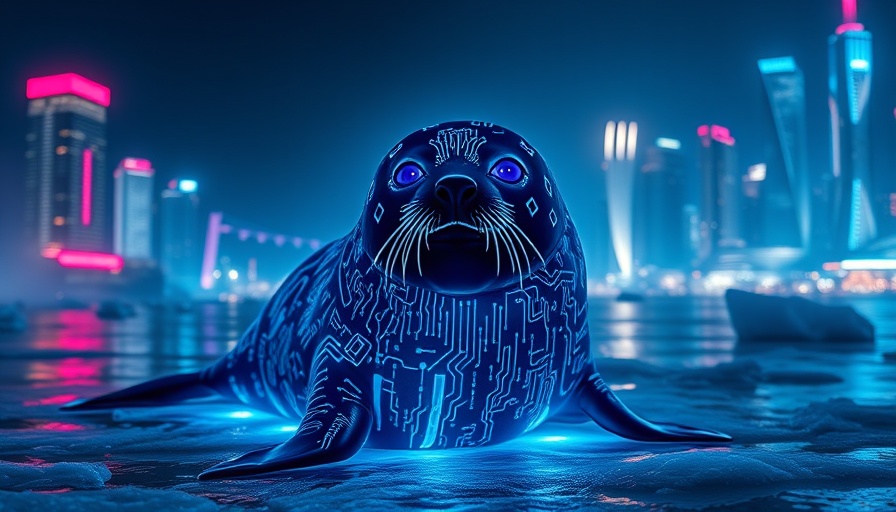
The Dawn of Self-Improving AI: MIT's SEAL Technique
In a rapidly evolving technological landscape, language models are reaching a new horizon with the introduction of MIT's Self-Adapting LLMs (SEAL) technique. This groundbreaking approach allows large language models (LLMs) to autonomously improve by generating synthetic data and fine-tuning themselves, transforming the way businesses can harness AI for efficiency and productivity.
What Is SEAL and Why Does It Matter?
SEAL empowers models to move beyond fixed external datasets, enabling them to autonomously create optimized training conditions. MIT's research team, part of the Improbable AI Lab, demonstrated that this capability allows models not only to learn continuously but to adapt to their environments without needing constant human intervention. The implications for AI for business are profound: businesses can take advantage of ever-evolving AI systems that self-improve over time, enhancing operational efficiency.
A Shift from Static to Dynamic AI Systems
Traditionally, LLMs needed manual fine-tuning to incorporate new information, often leading to inefficiencies or outdated knowledge. SEAL seeks to eliminate this limitation. By equipping models with the ability to generate self-edits—natural language outputs detailing how the model should update its parameters—businesses can have AI tools that are not just reactive but proactive in learning and adapting. This capability aligns perfectly with the aspirations of solopreneurs and entrepreneurs looking for scalable solutions in AI automation.
Performance and Practical Applications
The researchers have tested SEAL across two crucial domains: knowledge incorporation and few-shot learning. In knowledge incorporation, models updated their knowledge bases using syntactic information derived from reading comprehension datasets. This self-directed learning approach enhances their ability to tackle new information without compromising previously learned concepts.
In a practical business context, such capabilities translate into powerful AI tools for entrepreneurs. Imagine a marketing professional who needs rapid updates on content optimization strategies based on real-time data; SEAL's adaptive nature allows the model to iterate learning, enhancing its responses significantly over time.
Why SEAL Will Drive AI Productivity
With the traditional models often experiencing a decline in performance after fine-tuning—referred to as 'catastrophic forgetting'—SEAL integrates reinforcement learning to navigate this challenge effectively. This allows businesses to deploy AI that not only learns but retains foundational capabilities, catering to an array of scenarios without losing effectiveness.
Furthermore, computational efficiency has been a major roadblock for many organizations adopting AI solutions. SEAL utilizes innovative training mechanics, requiring less computational power while still delivering high-performance results. This is crucial for small business owners who may not have the vast resources that larger enterprises enjoy.
The Future of Self-Improving AI
SEAL represents a pivotal moment for artificial intelligence—it might just usher in a new era of self-learning, adaptive systems across various industries. With the ability to generate personalized data continuously, AI can enhance customer experiences through tailored interactions and insights. For AI SaaS companies, SEAL can provide a competitive edge, outpacing companies still reliant on static learning models.
As we move into a future driven by continual learning, the challenge lies in effectively implementing these advancements within existing frameworks. Initial hurdles related to performance evaluation and computational overhead exist, but the clear path towards more efficient, adaptive AI signals that the benefits far outweigh the challenges ahead.
Conclusion: Adapting to Tomorrow, Today
As small business owners, solopreneurs, and entrepreneurs explore the landscape of modern technological solutions, embracing tools like SEAL could define their path to growth and efficiency. This self-improving AI model signifies not just a technological breakthrough but a conceptual shift in how we view AI’s potential to adapt, learn, and support business objectives with enhanced productivity.
To stay ahead in the game, it's essential to keep an eye on emerging trends in AI productivity and how self-adapting tools like SEAL could revolutionize your operations. Explore the SEAL framework further to understand how it can be integrated into your business strategy.
 Add Row
Add Row  Add
Add 




Write A Comment